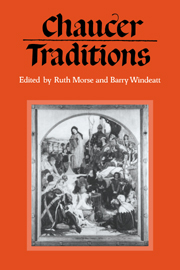Book contents
- Frontmatter
- Contents
- List of contributors
- Preface
- Note on the text
- 1 Chaucer traditions
- 2 Gower–Chaucer's heir?
- 3 Chaucer and Lydgate
- 4 Hoccleve and Chaucer
- 5 Chaucer and fifteenth-century romance: Partonope of Blois
- 6 Some Chaucerian themes in Scottish writers
- 7 The planetary gods in Chaucer and Henryson
- 8 Gavin Douglas: ‘Off Eloquence the flowand balmy strand’
- 9 Skelton's Garlande of Laurell and the Chaucerian tradition
- 10 Chaucerian metre and early Tudor songs
- 11 Aspects of the Chaucerian apocrypha: animadversions on William Thynne's edition of the Plowman's Tale
- 12 The shape-shiftings of the Wife of Bath, 1395–1670
- 13 The genius to improve an invention: transformations of the Knight's Tale
- 14 From the Clerk's Tale to The Winter's Tale
- 15 The Virtuoso's Troilus
- 16 Rewriting romance: Chaucer's and Dryden's Wife of Bath's Tale
- 17 Chaucer's religion and the Chaucer religion
- 18 A list of the published writings of Derek Brewer
- Index
8 - Gavin Douglas: ‘Off Eloquence the flowand balmy strand’
Published online by Cambridge University Press: 23 September 2009
- Frontmatter
- Contents
- List of contributors
- Preface
- Note on the text
- 1 Chaucer traditions
- 2 Gower–Chaucer's heir?
- 3 Chaucer and Lydgate
- 4 Hoccleve and Chaucer
- 5 Chaucer and fifteenth-century romance: Partonope of Blois
- 6 Some Chaucerian themes in Scottish writers
- 7 The planetary gods in Chaucer and Henryson
- 8 Gavin Douglas: ‘Off Eloquence the flowand balmy strand’
- 9 Skelton's Garlande of Laurell and the Chaucerian tradition
- 10 Chaucerian metre and early Tudor songs
- 11 Aspects of the Chaucerian apocrypha: animadversions on William Thynne's edition of the Plowman's Tale
- 12 The shape-shiftings of the Wife of Bath, 1395–1670
- 13 The genius to improve an invention: transformations of the Knight's Tale
- 14 From the Clerk's Tale to The Winter's Tale
- 15 The Virtuoso's Troilus
- 16 Rewriting romance: Chaucer's and Dryden's Wife of Bath's Tale
- 17 Chaucer's religion and the Chaucer religion
- 18 A list of the published writings of Derek Brewer
- Index
Summary
To begin with the idea of Douglas as a Scottish Chaucerian is to pre-empt a complicated issue, not least by making Chaucer central to Douglas's projects. Gavin Douglas was the third son of the Earl of Angus, a Scottish aristocrat before he was a prelate of the universal church. His ambitions were Scottish; he sought his advancement there. His university training in Paris gave him a grounding in scholasticism while he shared with his university acquaintances the newer learning, historical and literary. He knew the latest editions of Virgil and the most recent research into Scotland's past. Scotland's status as a nation and Scotland's place in European vernacular culture (or equally vernacular literature's place in Scotland) occupied him throughout his life. He went to Chaucer for the literary idiom he needed, but he fought both Chaucer's interpretation of Virgil and his elevation of love as a premier subject. His humanist ambitions reveal themselves in numerous ways, none of which apparently contradicted the human ambitions he revealed as a Douglas. His working life as a poet probably occupied a dozen or so years, from about 1501 (The Police of Honour) to 1513 (the translation of the Aeneid).
- Type
- Chapter
- Information
- Chaucer TraditionsStudies in Honour of Derek Brewer, pp. 107 - 121Publisher: Cambridge University PressPrint publication year: 1990
- 1
- Cited by

